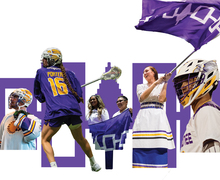Why Whitman jumped 32 spots in business school rankings
The Daily Orange File Photo
Whitman has been ranked the 23rd best undergraduate business school in the country by Bloomberg Businessweek.
At a reception held at the Martin J. Whitman School of Management last month, Amanda Nicholson quoted Michael Jordan.
“Some people want it to happen, some wish it would happen, others make it happen,” Nicholson, Whitman’s associate dean of undergraduate programs, recited the Jordan line.
She used it to explain that Whitman, like Jordan, works hard to make things happen.
Michael Jordan and Whitman also have something in common: the No. 23.
Jordan, the basketball great, wore jersey No. 23 for much of his playing career.
And Whitman has been ranked the 23rd best undergraduate business school in the country by Bloomberg Businessweek. The school’s ranking went up from No. 55 in 2015 to No. 23 this year — a 32-point climb.
Ken Kavajecz, dean of Whitman, said the faculty’s cutting-edge research, an emphasis on attracting strong students, providing them with a beneficial undergraduate experience and positioning them for job opportunities helped Whitman’s ranking.
“If we focus on those four things, rankings follow,” Kavajecz said.
Bloomberg Businessweek has ranked undergraduate business schools since 2006. This year’s survey was released after collecting responses from nearly 30,000 students and recruiters from almost 600 companies. The ranking is outcome-based, meaning employer surveys weighed heavily.
Employer feedback comprised 40 percent of a school’s total score. Employers evaluated schools on how well they prepared recent graduates for jobs.
Will Geoghegan, an assistant professor of management, said Whitman keeps faculty, students and employers in the loop. When students become employed, Whitman faculty listens to employer feedback to see what deficiencies students may have.
“I could ask (employers), ‘What do you notice? What can I bring back into my class?’” Geoghegan said. “We’re very much closing that loop in that you don’t just send the students out and say, ‘Oh, we hope they did well.’ It’s that feedback loop to see what we can improve upon going forward.”
One area that students struggled with was Excel. Now, every incoming freshman is required to take an Excel certification exam.
Thirty-five percent of the ranking was based on a student survey, including students’ ratings of the campus, career services and faculty. Students’ starting salaries made up 15 percent of the ranking. The last 10 percent was allotted for the percentage of a school’s graduates who had at least one internship.
Experiential learning also contributed to the school’s high ranking. The Orange Value Fund, a money management and investment program, gives students experience in business analytics. Enactus, an organization that creates economic, environmental and social sustainability projects, engages students in the community. Whitman’s Goodman IMPRESS program — a “soft skills” competition — helps engage students beyond the classroom setting. Consurtio, a student-run business, provides students the opportunity to run a real company.
“IMPRESS incentivizes students so that when you do graduate, you have a full resume that shows what a rounded individual you are, rather than your GPA being 3.8,” Geoghegan said.
Students are further challenged outside of the classroom by participating in emotional intelligence workshops and LinkedIn seminars, interacting with guest speakers and taking certification exams in topics such as Microsoft Office.
“I think there’s just been far more energy and engagement,” Geoghegan said. “Energy and engagement from faculty, from the student body, from staff. I think that has given us a certain direction.”
Published on May 2, 2016 at 11:28 pm
Contact Matthew: mguti100@syr.edu | @MatthewGut21





